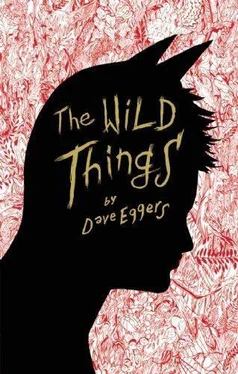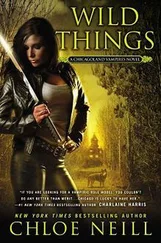Dave Eggers - The Wild Things
Здесь есть возможность читать онлайн «Dave Eggers - The Wild Things» весь текст электронной книги совершенно бесплатно (целиком полную версию без сокращений). В некоторых случаях можно слушать аудио, скачать через торрент в формате fb2 и присутствует краткое содержание. Год выпуска: 2009, Издательство: McSweeney's, Жанр: Современная проза, на английском языке. Описание произведения, (предисловие) а так же отзывы посетителей доступны на портале библиотеки ЛибКат.
- Название:The Wild Things
- Автор:
- Издательство:McSweeney's
- Жанр:
- Год:2009
- ISBN:нет данных
- Рейтинг книги:4 / 5. Голосов: 1
-
Избранное:Добавить в избранное
- Отзывы:
-
Ваша оценка:
- 80
- 1
- 2
- 3
- 4
- 5
The Wild Things: краткое содержание, описание и аннотация
Предлагаем к чтению аннотацию, описание, краткое содержание или предисловие (зависит от того, что написал сам автор книги «The Wild Things»). Если вы не нашли необходимую информацию о книге — напишите в комментариях, мы постараемся отыскать её.
The Wild Things — читать онлайн бесплатно полную книгу (весь текст) целиком
Ниже представлен текст книги, разбитый по страницам. Система сохранения места последней прочитанной страницы, позволяет с удобством читать онлайн бесплатно книгу «The Wild Things», без необходимости каждый раз заново искать на чём Вы остановились. Поставьте закладку, и сможете в любой момент перейти на страницу, на которой закончили чтение.
Интервал:
Закладка:
The air felt so cold and clean, and he gulped at it. The ocean beyond them was bright and calm, and pulled at Max. But he felt so weak that he couldn’t keep his eyes open. As Katherine stroked his wet hair, he dropped into a shallow sleep.
CHAPTER XLVIII
When he awoke he saw all of the beasts, all but Carol, before him. They had untied his boat and had prepared it to sail. Max rose from Katherine’s lap and stood, still feeling light-headed.
“So you’re going,” Douglas said. His leg, half-eaten by the plant, was green and smelled like ham. There was a stick tied to his shoulder, in place of his missing arm.
Max nodded.
Douglas extended his left hand. Max shook it.
“You were the best thinker we ever had,” Douglas said.
Max tried to smile.
“I’m sorry for all this,” Ira said quietly. “I blame myself.”
Max hugged him. “Don’t.”
Judith and Max exchanged glances. She made a face that said Oops, sorry! then emitted a high nervous laugh. “I never know what to say in these situations,” she said.
Max and Katherine pushed the boat toward the water, and Douglas helped. Max remembered that he was still wearing the crown, and so removed it with great care and presented it to the Bull.
Max’s head felt lighter now, his thoughts clearer. Looking at the beasts, he tried to commit each of them to memory. He wished Carol were there, but at the same time he knew that goodbyes were seldom as tidy and timely as one would hope. He turned toward his boat and the sea beyond, squinting to the waves to see what challenges they would present to him.
When the hull had left the sand and was floating in the calm water, Max stepped in. Standing on the stern, he turned to hug Katherine. Her body shook, crying, but when they parted she seemed good, seemed strong.
Max raised his sail and grabbed the rudder. He was ready. Douglas and Ira pushed the boat the last few feet until it was free of the beach.
As the tide took Max out, there was a great rustling through the forest. They all looked up. A pair of great fronds parted and there he was. It was Carol. He broke through the foliage and ran toward the shore, his arms flailing.
Max locked eyes with him and when he did, Carol stooped at the top of the dunes, his shoulders slack. In Carol’s face, Max saw only sadness. There was no more anger, no more want, nothing but sorrow and regret.
As the sail pulled Max further away, he and Carol kept their eyes fixed on each other. Almost in a trance, Carol began to walk toward the shore. He descended the dunes and staggered across the beach, his eyes growing more anxious as he approached the sea. He walked past the other beasts and stumbled into the ocean, having no sense of where he was. It wasn’t until he was chest-deep in the water that he realized Max was too far away to reach. At that moment Carol looked like he might fall apart, dropping limb by limb into the sea.
Knowing it was the only thing to do, Max howled.
The howl sounded like forgiveness, and this was all, it seemed, Carol wanted. He was overcome, his eyes a mess of tears. He stopped, chest-deep in the ocean, just short of drowning. Gathering himself, he howled in return. “Arooooooo! Arrrroooooooooooooooooo!”
Their howls rose to the sky and twisted together until they were one, and the other beasts joined in too, all of their voices creating a wild, plaintive song of sorrow and abandon and anger and love. They howled together until Max was far into the sea, gone forever.
CHAPTER XLIX
Max sailed under a full moon, with no land in front of him or behind him. He set his compass south, hoping that traveling in the opposite direction would bring him home. But for all he knew, it might bring him to another land altogether.
He sailed in and out of days and nights, through storms and bright dull mornings so long he thought they’d never cede the afternoon. And finally, one morning, he saw a caterpillar inching across the horizon, and that caterpillar soon grew to become land stretching west and east, and that land grew to become, he was sure, the forest from which he’d pushed off.
When he finally made land, he docked the boat in the same inlet and tied it to the same tree where he’d found it. He ran, as fast as he could, through the forest. The snow had melted and now there were only a few pockets of white. He was so close to home.
He left the forest and reached the road, loving the feel of pavement on his feet. He ran through the neighborhood, all of the houses dark but his own. He could see it clearly in the distance, and from its windows light still shone brightly.
Max ran his fastest until he was a few houses away, when he slowed down to a jog, then a walk. Why did he slow down? It confused Max, too. Perhaps it was the very weight of being home again. He’d been gone so long. Years, it seemed. And now he was back, and he was different. Would his mother recognize him? Would Claire? In some ways he felt too big for this house. But he also felt newly able to fit within it.
Max entered, trying not to make any noise as he closed the door. He passed through the front hallway and saw his art-class bird, which had miraculously been repaired. Upon closer inspection he could see that his mother had fixed it, with the utmost delicacy and care. It was whole and new again.
Passing through the kitchen, Max saw on the counter a whole meal laid out for him — a bowl of cream of mushroom soup, a glass of milk, and a slice of cake. Still standing, he ate with greedy gulps, and while doing so he saw his mom, asleep on the couch.
He swallowed the food, slipped the wolf hood off his head, and walked to her. Standing over her, Max could see that she had fallen asleep with her glasses on. Her hair was matted close to her temple.
Max stared down at her, his head tilted, watching her. He carefully removed her glasses and set them silently on the table before her. He touched her face gently, pushing a strand of hair back behind her ear. He stood above his mother for some time, knowing her now, really almost knowing her now, happy to watch her rest.
ACKNOWLEDGMENTS
It goes without saying that this book would not exist without Maurice Sendak and Spike Jonze. Back in 1963, Maurice published a strange and unprecedented picture book, a book I read as a child, was terrified by, and finally came to grips with somewhere in my early twenties. Epochs later, Spike called me out of the blue one day in 2003, asking me if I’d like to collaborate on the screenplay for a film adaptation he was doing of the book. I said yes, and I owe him an incalculable amount for thinking of me, and not, say, an experienced screenwriter.
And so the process began. Spike laid out the basics of what he had in mind — that Max was the son of divorced and somewhat distracted parents, that he had a sister, and that when he sails to the island, the journey, and the island, and all those he meets there, are very real. Spike and I tried to flesh out the story from there, starting with the question of not where but who the Wild Things are, and what they want from life and from Max.
Over the years (decades?) we worked on the script, I was able to meet Mr. Sendak, as true and uncompromising an artist and genuine a man as there ever was. Maurice called one day and said that the idea had occurred to him and others that a novel could be written from all this accumulated material, and he asked if I’d like to do it. I said I would try, and this is the result.
If you’ve seen the movie, you will notice that the story here hews closely to the movie in many places, and departs in others. When sitting down to write this book, I thought at first that I would more or less transcribe the movie. But along the way, while getting lost, Max-like, in the thicket of the plot, I found other pathways into and out of the island, and generally added my own interpretations to the story of Max. The children’s book Max is, after all, a version of Maurice, and the movie Max is a version of Spike. The Max of this book, then, is some combination of Maurice’s Max, Spike’s Max, and the Max of my own boyhood.
Читать дальшеИнтервал:
Закладка:
Похожие книги на «The Wild Things»
Представляем Вашему вниманию похожие книги на «The Wild Things» списком для выбора. Мы отобрали схожую по названию и смыслу литературу в надежде предоставить читателям больше вариантов отыскать новые, интересные, ещё непрочитанные произведения.
Обсуждение, отзывы о книге «The Wild Things» и просто собственные мнения читателей. Оставьте ваши комментарии, напишите, что Вы думаете о произведении, его смысле или главных героях. Укажите что конкретно понравилось, а что нет, и почему Вы так считаете.












